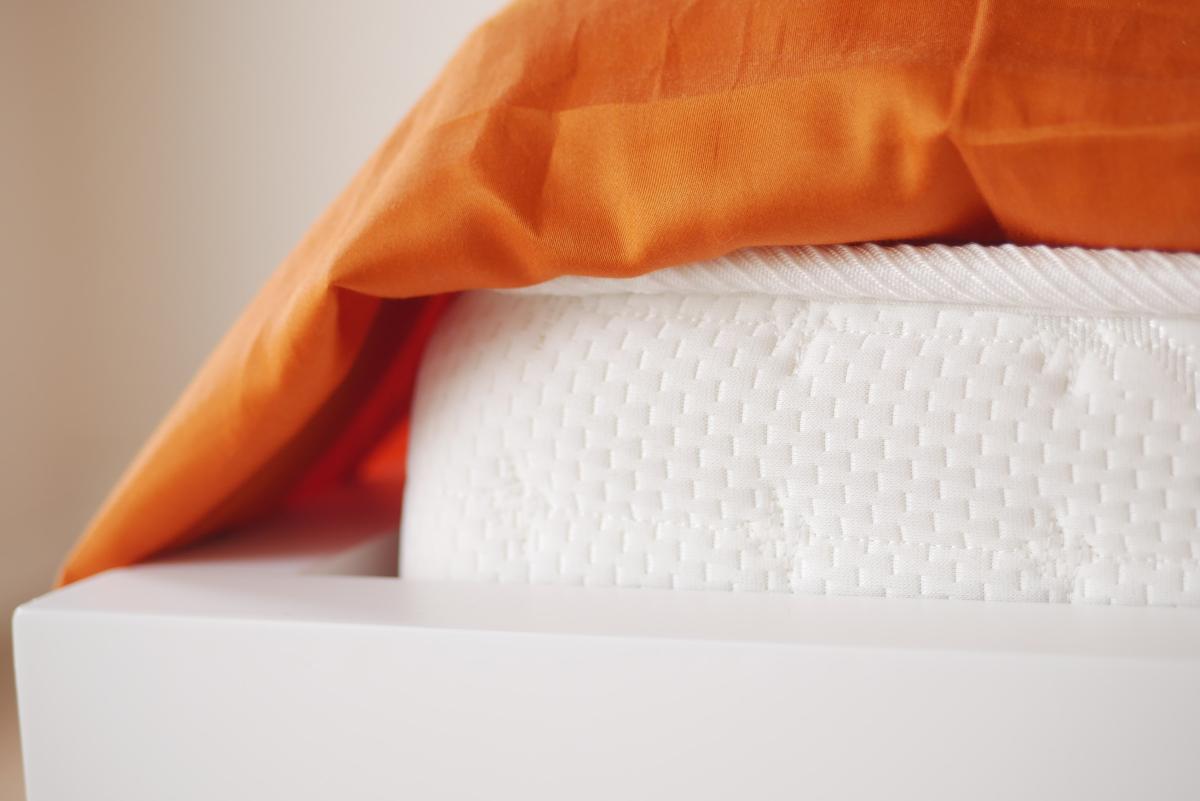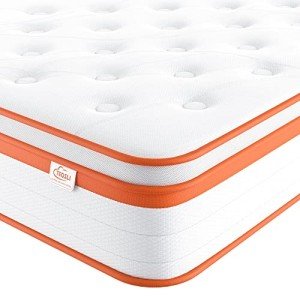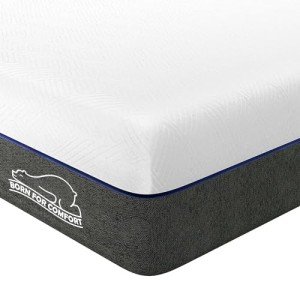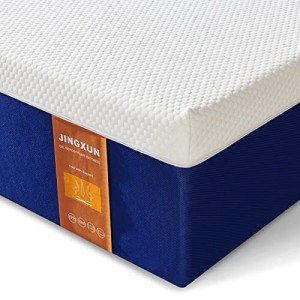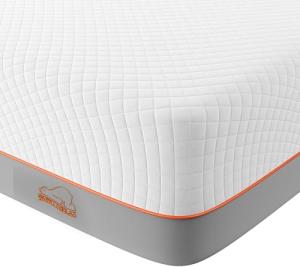Introduction
Welcome to the comprehensive guide on memory foam mattresses and how they can contribute to better sleep! In this article, we will delve into the world of memory foam mattresses, exploring their benefits, features, and how they can revolutionize your sleep experience. Whether you are a side sleeper, back sleeper, or stomach sleeper, a memory foam mattress can provide the comfort and support you need to achieve a restful night's sleep. So, let's dive in and uncover the wonders of memory foam mattresses!
What is a Memory Foam Mattress?
A memory foam mattress is a type of mattress that is made from viscoelastic foam, a material that is both soft and highly energy absorbent. This unique combination allows the memory foam to contour to the shape of your body, providing personalized support and comfort. Memory foam mattresses are known for their ability to relieve pressure points and align the spine, making them a popular choice for those seeking a restful and rejuvenating night's sleep.
How Does Memory Foam Work?
Memory foam mattresses respond to heat and pressure, which allows them to contour to the shape of your body. When you lie down on a memory foam mattress, the foam softens in response to your body heat, molding to your body's curves and providing support where you need it most. This adaptive technology helps to distribute your body weight evenly, reducing pressure points and promoting proper spinal alignment. As you shift positions during the night, the memory foam adjusts to accommodate your movements, ensuring a comfortable and uninterrupted sleep.
Benefits of a Memory Foam Mattress
Memory foam mattresses offer a wide range of benefits that can significantly improve your sleep quality and overall well-being. Here are some of the key benefits of choosing a memory foam mattress:
1. Pressure Relief
Memory foam mattresses are designed to relieve pressure points by distributing weight evenly across the surface of the mattress. This can help to alleviate discomfort and pain in areas such as the hips, shoulders, and lower back, allowing you to wake up feeling refreshed and pain-free.
2. Spinal Alignment
Proper spinal alignment is essential for a restful night's sleep and overall health. Memory foam mattresses are known for their ability to support the natural curvature of the spine, helping to prevent back pain and stiffness. By promoting proper alignment, memory foam mattresses can enhance your sleep quality and reduce the risk of long-term spinal issues.
3. Motion Isolation
If you share your bed with a partner, you may be familiar with the disruptive effects of their movements during the night. Memory foam mattresses excel in motion isolation, meaning that they can absorb and minimize the transfer of motion across the bed. This can help you and your partner enjoy a more peaceful and undisturbed sleep, even if one of you tends to toss and turn.
4. Allergy-Friendly
Memory foam mattresses are inherently resistant to dust mites and allergens, making them an excellent choice for those with allergies or asthma. The dense structure of memory foam limits the accumulation of allergens, providing a clean and healthy sleep environment for allergy sufferers.
5. Durability
Memory foam mattresses are built to last, with many high-quality models retaining their shape and supportiveness for years to come. This durability ensures that you can enjoy the benefits of your memory foam mattress for an extended period, making it a worthwhile investment in your sleep and overall well-being.
Types of Memory Foam Mattresses
Memory foam mattresses come in various types, each offering unique features and benefits to suit different sleep preferences. Here are some of the most common types of memory foam mattresses:
1. Traditional Memory Foam
Traditional memory foam mattresses are made from viscoelastic foam and are known for their contouring properties. These mattresses offer a plush and cradling feel, providing exceptional pressure relief and support for a restful night's sleep.
2. Gel Memory Foam
Gel memory foam mattresses are infused with gel beads or layers to enhance cooling and breathability. The addition of gel helps to regulate temperature and prevent overheating, making gel memory foam mattresses an ideal choice for hot sleepers.
3. Plant-Based Memory Foam
Plant-based memory foam mattresses are made from natural and eco-friendly materials, offering a more sustainable and environmentally conscious sleep solution. These mattresses are free from harmful chemicals and off-gassing, making them a safe choice for those with sensitivities.
4. Open-Cell Memory Foam
Open-cell memory foam mattresses feature a more breathable and responsive foam structure, allowing for better airflow and heat dissipation. This can help to keep you cool and comfortable throughout the night, promoting a deeper and more restful sleep.
How to Choose the Right Memory Foam Mattress
Selecting the right memory foam mattress is essential to ensure that you enjoy the full benefits of this innovative sleep technology. Here are some key factors to consider when choosing a memory foam mattress:
1. Firmness Level
Memory foam mattresses come in varying firmness levels, ranging from soft to firm. Your preferred firmness level will depend on your sleep position, body weight, and personal comfort preferences. Side sleepers may prefer a softer mattress for enhanced pressure relief, while back and stomach sleepers may opt for a firmer mattress for additional support.
2. Thickness
The thickness of a memory foam mattress can impact its comfort and support level. Thicker mattresses typically provide more cushioning and contouring, while thinner mattresses may offer a firmer feel. Consider your body weight and sleep preferences when choosing the thickness of your memory foam mattress.
3. Density
The density of memory foam affects its durability and supportiveness. Higher-density foam is more durable and resistant to sagging, making it a suitable choice for long-term use. Lower-density foam may provide a softer feel but could wear out more quickly over time.
4. Temperature Regulation
If you tend to sleep hot or live in a warm climate, consider a memory foam mattress with cooling features such as gel infusion or open-cell technology. These features can help to dissipate heat and regulate your body temperature, ensuring a cool and comfortable sleep environment.
5. Certifications
Look for memory foam mattresses that are CertiPUR-US® certified, which guarantees that the foam is free from harmful chemicals and toxins. This certification ensures that you are investing in a safe and high-quality product that meets rigorous standards for environmental and human health.
Care and Maintenance of Memory Foam Mattresses
Proper care and maintenance are essential to prolong the lifespan of your memory foam mattress and ensure optimal sleep quality. Here are some tips for caring for your memory foam mattress:
1. Rotate the Mattress
Rotate your memory foam mattress every 3-6 months to promote even wear and prevent sagging. This can help to extend the longevity of your mattress and maintain its supportiveness over time.
2. Use a Mattress Protector
Invest in a waterproof and breathable mattress protector to safeguard your memory foam mattress from spills, stains, and dust mites. A mattress protector can also help to maintain a clean and hygienic sleep environment, prolonging the life of your mattress.
3. Keep It Clean
Regularly vacuum your memory foam mattress to remove dust, dirt, and allergens that can accumulate over time. Spot clean any stains or spills promptly with a mild detergent and water, taking care not to saturate the foam.
4. Allow for Air Circulation
To prevent moisture buildup and odor, allow your memory foam mattress to air out regularly by removing the sheets and bedding. This can help to refresh the mattress and maintain a fresh and clean sleep surface.
5. Avoid Direct Sunlight
Memory foam mattresses are sensitive to heat and sunlight, which can cause the foam to break down and deteriorate prematurely. Keep your mattress out of direct sunlight and extreme temperatures to preserve its integrity and performance.
Memory Foam Mattresses FAQs
Here are some frequently asked questions about memory foam mattresses:
1. Are memory foam mattresses good for back pain?
Yes, memory foam mattresses are excellent for back pain as they provide targeted support and pressure relief to alleviate discomfort and promote proper spinal alignment. The contouring properties of memory foam help to distribute weight evenly and reduce pressure on the back muscles, leading to a more restful and pain-free sleep.
2. Do memory foam mattresses sleep hot?
While traditional memory foam mattresses may retain heat, modern advancements such as gel infusion and open-cell technology have improved temperature regulation. Gel memory foam mattresses and open-cell memory foam mattresses are designed to dissipate heat and keep you cool throughout the night, making them an ideal choice for hot sleepers.
3. How long do memory foam mattresses last?
On average, a high-quality memory foam mattress can last between 7 to 10 years with proper care and maintenance. Regularly rotating the mattress, using a mattress protector, and keeping it clean can help extend its lifespan and ensure lasting comfort and support.
4. Can memory foam mattresses be flipped?
Memory foam mattresses are designed to be used on one side only and should not be flipped like traditional innerspring mattresses. Flipping a memory foam mattress can disrupt its comfort layers and compromise its structural integrity, leading to uneven wear and reduced durability.
5. Do memory foam mattresses have an initial odor?
Some memory foam mattresses may have a slight odor when first unpacked, known as off-gassing. This is normal and is due to the release of volatile organic compounds (VOCs) from the foam. To minimize the odor, allow the mattress to air out in a well-ventilated room for a few days before using it.
6. Can memory foam mattresses be used on adjustable bases?
Yes, memory foam mattresses are compatible with adjustable bed frames and bases, allowing you to customize your sleep position for optimal comfort and support. The flexibility of memory foam allows it to contour to the adjustable base without compromising its performance or durability.
Summary
A memory foam mattress offers a myriad of benefits that can improve your sleep quality and overall well-being. From pressure relief and spinal alignment to motion isolation and durability, memory foam mattresses are designed to enhance your sleep experience and provide the comfort and support you need for a restful night's sleep. By selecting the right memory foam mattress, practicing proper care and maintenance, and addressing common questions and concerns, you can make the most of this innovative sleep technology and enjoy the many advantages it has to offer. Invest in a memory foam mattress today and experience the transformative power of better sleep!
